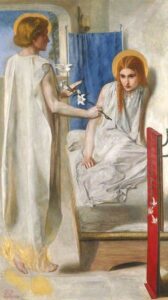In the novel, Romance of a Shop, Gertrude wants to be loved for who she is. While this does not seem too much to ask, apparently it is. The quote that I will mostly focus on for this post is one about respect and love intertwining. “Lord Watergate might have loved her more if he had respected her less, or at least allowed for a little feminine waywardness. Like the rest of the world, he had failed to understand her, to see how weak she was, for all her struggles to be strong” (Levy 294). In this passage, there is the idea that if she was less known by him then she would be loved by him. If this is viewed through the lens of the poem, “In an Artist’s Studio” by Christina Rossetti, it is made clear that men only want women that can provide what they want her to be. The last two lines of the poem state “not as she, but was when hope shone bright; / not as she is, but as she fills his dream” (Rossetti 13-14). The poem is about how a woman is not truly seen, she is nameless and on canvases for men to enjoy and build up an idea of who she is in their own imagination. Much like Rossetti, Gertrude also feels this as she holds onto the idea that Lord Watergate would not love her because he has this respect for her, while he does not know all her weaknesses and struggles, he knows her more than she believes he does. This lens is important because it shows how Gertrude wants to be viewed, part of her wants to be mysterious and not respected so he will love her and the other side of her wants him to know her inside and out and still choose her. However, her story does not end there. Unlike the character in Rossetti’s poem, Gertrude is loved by him, at the end it is important to note that she looks into “the lucid depths of his eyes,” (Levy 297). She finds this depth in him and while it does not say that he also finds this depth, it can be implied in the way that he takes her into his arms. Rossetti’s poem is important because it shows how Gertrude viewed her sisters and herself, as either a painting to be admired or a woman who was too respected to truly love. The new woman and the “old woman” both fail, they both are either left with no love at all or a shallow one. This reflects on the time as the new woman was seen as someone who would never marry, never have children, and be independent. While Amy Levy shows this stereotypical new woman through Gertrude, she adds a sense of humanity and longing for love to her that breaks the stereotype. Levy leaves women who feel like the new woman and also those who want to escape the canvas a seed of hope that they too can be loved as a full person, weaknesses, personality, struggle, and all.

This is a wonderful poem to bring into this argument, especially since Rossetti was referenced in the footnotes of Romance of a Shop at least a few times. I also love how you use the element of art to analyze the dynamics of love and gender in this novel. It made me think of the conversation we had in class about the significance of photography for these female characters and how they are in charge of what is captured by the camera. I’m not familiar with the Rossetti poem, but from the title and the painting at the bottom I assume it’s about the artist’s muse. I wonder if you could draw a connection between woman as the subject of art and woman as the creator of art in Romance of a Shop – maybe talking about how Levy inverts the traditional gender roles of artistry in her writing.
I loved reading how you intertwined The Romance of a Shop and “In an Artist’s Studio.” Your point about men wanting women to be a certain way reminded me of our conversation in class today about Dorian Gray and Sybil. In particular, it made me reflect on when Dorian tells Sybil, “I loved you because you were marvelous, because you had genius and intellect” (Wilde, 75). While Dorian’s desire for Sybil to be “marvelous” contrasts Lord Watergate’s feeling of wanting to respect Gertrude less, they both represent men having desires/requirements of their lovers.